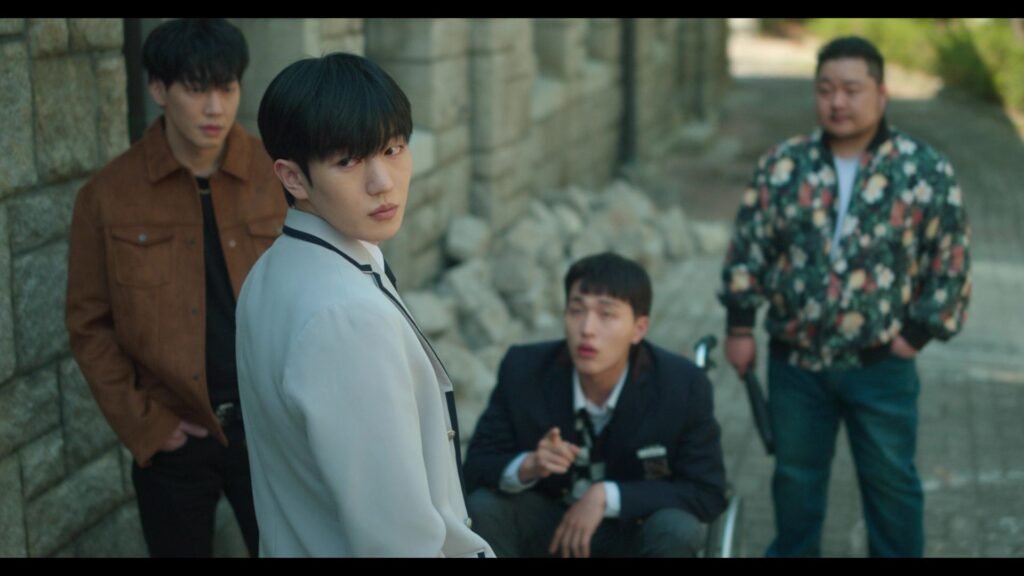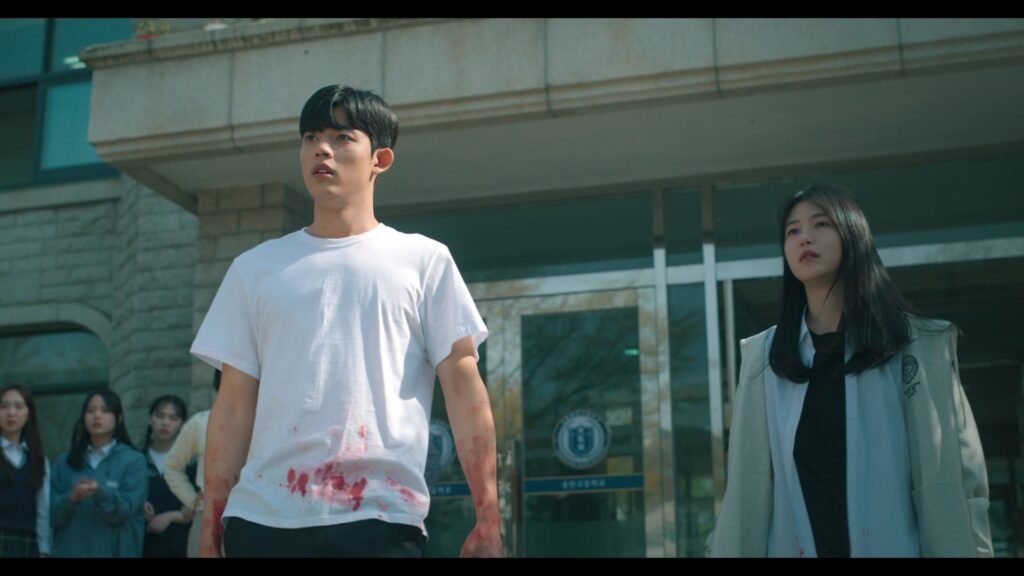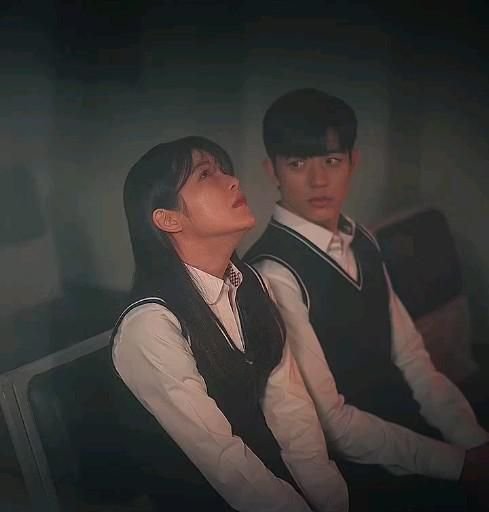
Revenge of Others: Amazing K-drama Series Review 2024
Table of Contents
Revenge of Others: Best K-drama Series Review 2024

Introduction
In the vast landscape of Korean dramas, or kdramas, one title stands out for its compelling storyline, dynamic characters, and intense emotions – “Revenge of Others.” This gripping series delves into the complexity of human nature, the power of revenge, and the consequences of one’s actions. Join me as we explore the mesmerizing world of “Revenge of Others” and uncover the mysteries that unfold in each episode.
Plot

“Revenge of Others” follows the story of [insert main character’s name], a [insert main character’s role] who is determined to seek justice for the wrongdoings inflicted upon them. As the plot unravels, we are taken on a rollercoaster ride of emotions, with twists and turns that keep us on the edge of our seats. The intricate web of relationships, betrayals, and secrets adds depth to the narrative, making it a truly immersive viewing experience.
Characters

The strength of “Revenge of Others” lies in its well-developed characters, each with their own motivations, flaws, and inner struggles. From the resilient protagonist to the enigmatic antagonist, every character adds layers to the story and leaves a lasting impact on the audience. The stellar performances by the cast breathe life into these characters, making them relatable and memorable in every scene.
Themes

At its core, “Revenge of Others” explores themes of vengeance, redemption, forgiveness, and the blurred lines between right and wrong. Through the characters’ journeys, we are forced to confront our own beliefs and values, questioning what we would do in their shoes. The emotional depth of the series resonates with viewers on a profound level, sparking conversations and introspection about morality and justice.
Production
The production quality of “Revenge of Others” is top-notch, from the cinematography to the soundtrack. Each frame is meticulously crafted to enhance the mood and atmosphere of the story, drawing us deeper into its world. The attention to detail in the set design, costumes, and visual effects elevates the viewing experience and transports us to the characters’ reality.
Revenge of Others (2022) Official Trailer 2 | Park Solomon, Shin Ye Eun, Seo Ji Hoon | Disney+
Watch this video on YouTube: https://www.youtube.com/watch?v=FirxolLxNIM
Conclusion
In conclusion, “Revenge of Others” is a kdrama that captivates, challenges, and mesmerizes viewers with its compelling narrative, complex characters, and emotional depth. Whether you’re a seasoned kdrama enthusiast or a newcomer to the genre, this series is a must-watch for those who appreciate thought-provoking storytelling and exceptional performances. Dive into the world of “Revenge of Others” and let yourself be immersed in a mesmerizing tale of redemption, revenge, and the enduring power of the human spirit.
Reviews by People
- A Riveting Tale of Retribution and Redemption
Rating: 5/5
Review: “Revenge of Others delivers a gripping narrative filled with intriguing characters and emotional depth. A must-watch!” - Compelling Characters and Complex Relationships
Rating: 4.5/5
Review: “The characters in Revenge of Others are layered and well-developed, driving the story forward with their intertwined destinies.” - A Masterclass in Emotional Storytelling
Rating: 4/5
Review: “The emotional journey in Revenge of Others is intense and captivating, exploring themes of justice, revenge, and forgiveness with finesse.” - Visually Stunning and Cinematically Rich
Rating: 4.5/5
Review: “The production quality of Revenge of Others is stellar, with breathtaking cinematography and exquisite attention to detail in every frame.” - Intrigue, Betrayal, and Unforgettable Twists
Rating: 4/5
Review: “Revenge of Others keeps viewers engaged with its intricate plot, unexpected twists, and morally ambiguous characters. A compelling watch.” - Powerful Performances that Resonate
Rating: 4.5/5
Review: “The cast of Revenge of Others delivers remarkable performances that convey raw emotions and depth, making the characters truly unforgettable.” - A Thought-Provoking Exploration of Morality
Rating: 4/5
Review: “Revenge of Others challenges viewers to contemplate the complexities of morality, justice, and the consequences of seeking revenge. An impactful series.” - Emotional Rollercoaster with Unforgettable Impact
Rating: 5/5
Review: “Revenge of Others takes viewers on an emotional rollercoaster ride, leaving a lasting impact with its poignant themes and powerful storytelling.”
Gallery


































































More Reviews
Revenge of Others: A Sad & Topical Social Issue
“Revenge of Others” is set in the world of South Korean high school students. This is not just another teenage squabble; it’s a story with substance and depth. The drama’s plot, interwoven with flexible subplots, tackles a sad and highly topical social issue. It deals with the subject in a palpable, exciting, sensitive, and touching way. Should you watch it? Absolutely!
Much like “Weak Hero Class 1” in 2022, “Revenge of Others” explores the theme of mobbing or bullying. The Korean slang term ‘wang-ta’ is commonly used to describe this phenomenon. Understanding ‘wang-ta’ helps to grasp the increasingly dramatic situations surrounding bullying in South Korean schools, which can sometimes tragically lead to suicide.
The KDrama focuses on a high school in Seoul where a student’s suicide shocks everyone. While some people know more than they reveal, the victim’s sister, who has been separated from her brother for many years, decides to investigate the truth. Without her, this tragic case might have been quietly forgotten. The show courageously delves into the truth and the circumstances through the character of Ok Chang-mi.
As is often the case with bullying, the adults in the story seem ineffective and unable to change the fatal dynamics of peer groups. They remain on the sidelines, leaving the high school students to navigate their relationships and social hierarchies on their own. The students must find a way to coexist with their classmates, often trying to stay unnoticed under the social ‘wang-ta’ radar or relying on a strong support network.
“Revenge of Others” is designed for the international streaming market. Although it avoids excessive brutality, as is typical for Disney productions, it focuses more on relationship dynamics, causal connections, and shades of gray, unlike more intense dramas like “Weak Hero Class 1.” The show also features a promising cast of actors who deliver compelling performances.
SIDE NOTE: Wang-ta in South Korea
Wang-ta focuses on the active and violent marginalization of an outsider, rather than the act of bullying or harassment. It can be a derogatory term for the excluded person or describe the bullying activity. In South Korea’s collectivist society, group affiliation and interests are paramount, whether in the family, school class, or peer groups. This value system can lead to a dangerous situation in cases of bullying: outsiders bring shame to the group and find themselves at the bottom of the social hierarchy.
Regardless of the reason—be it school performance, family background, origin, minority status, appearance, dress, disability, belief, or inclination—no one wants to be labeled as Wang-ta. This label becomes a free pass for cruel bullying, with perpetrators, victims, and witnesses all tacitly agreeing that bullying is permissible. The victims feel even more inferior, and the bystanders often silently endorse the actions or even join in. There is no moral barrier against such behavior in South Korea’s collectivist culture, sometimes leading to entire schools participating in one person’s wang-ta.
From a Western, individualistic perspective, this might be difficult to understand, as other socially recognized ethical principles could confront Wang-ta behavior. Unfortunately, such principles are rare in South Korean schools with their collectivist social culture.
SIDE NOTE: Punishment vs. Suffering of Victims
The psychological trauma suffered by bullying victims can have long-lasting effects. Unfortunately, the punishment for perpetrators is often inadequate. It may be annoying for them but rarely acts as a deterrent. It takes significant events before expulsion is even considered, and any record of the offense is often expunged two years after graduation. In contrast, the victims cannot easily erase their traumatic memories.
Documented cases of Wang-ta in South Korean schools have steadily increased over the past three decades, with many incidents going unreported. A study by the Ministry of Education found that cases more than doubled from 11,749 in 2013 to 31,130 in 2017. Increasing numbers of victims view suicide as their only escape. It is now documented that South Korean students with personal Wang-ta experiences are more prone to suicidal thoughts than those without. In 2020 alone, nearly 1,000 young people took their own lives, making suicide the leading cause of death among 10- to 24-year-olds.
Due to the lack of serious consequences for perpetrators in Wang-ta cases, some families of victims resort to vigilante justice. “Revenge of Others” explores this theme, much like “Angry Mom” did a few years earlier. Faced with insufficient punitive measures, some families hire peers to administer ‘undercover’ punishment. While resolving violence with violence is a dubious solution, it often seems the only way to show perpetrators real consequences and provide victims with a semblance of satisfaction. Unfortunately, this satisfaction is often more for the victims’ families, as the victims themselves continue to struggle with their psychological wounds and scars. Revenge does not undo the painful experience of mental and physical harassment.
Revenge of Others: A Drama of Twists, Social Issues, and Inconsistent Logic
“Revenge of Others” is a drama that initially feels somewhat mediocre and even depressing but gradually improves as the plot unfolds. The main leads, portrayed by Lomon and Seo Ji Hoon, have deeply tragic backstories, creating a sense of urgency and a desire to protect them at all costs. Their performances were standout, consistently delivering strong and engaging portrayals. Both actors not only impressed with their acting skills but also stole the show with their presence. However, I would have liked to see more screen time for Seo Ji Hoon.
The acting, characters, and story were somewhat inconsistent. While some scenes were great, others fell short. Shin Ye Eun had some impressive moments, but there were times when her character didn’t quite convince me. She often seemed annoyingly naive, changing sides as frequently as a ping-pong ball in a tournament. Nevertheless, her chemistry with Lomon was lovely, and she displayed a badass persona when not acting foolishly.
Most of the other female characters were generally cool, complex, and lovable, demonstrating strong friendships. Lee Soo Min, however, seemed constrained by her stereotypical “mean girl” role. Despite this, she did a fantastic job, and I hope to see her in more nuanced roles in the future. Chae Sang Woo’s performance left something to be desired, as it felt like there was something missing in his portrayal, even though his character sparked curiosity.
The drama touches on several social issues but doesn’t delve deeply into them. It also suffers from inconsistencies in funding, illogical solutions, situations, and decisions, resulting in a lack of logic and numerous loose ends. The number of times the male lead gets hit in the head is excessive, with some blows seemingly severe enough to be lethal. Despite these flaws, the drama kept me guessing from start to finish. While there were clues, they were so scattered that piecing them together was a challenge, which I enjoyed.
The OST is lovely, and the cinematography is beautiful, though the filming style may occasionally induce motion sickness. Overall, “Revenge of Others” is a decent watch, especially if you’re in the mood for pretty people fighting, splattering blood, and staying one step ahead of the police while solving multiple mysteries and falling in love. Just don’t expect too much logic or any kisses.
Revenge of Others: Mixed Feelings and Unmet Expectations
After Watching 6 Episodes
After eagerly following the latest episodes of “Revenge of Others,” I found myself at a crossroads. The drama is jam-packed with secrets, almost as if the creators were desperately trying to keep the audience hooked with an overload of unexpected twists. The concept of revenge is intriguing, but the sheer number of teenage issues crammed into the plot is overwhelming.
The abundance of subplots creates a convoluted narrative that becomes difficult to follow. Initially, I had high hopes for this series, but it has fallen short of my expectations. I’ve decided to stop watching it for now, though there’s a slight chance I might return to it in the future. At this moment, I’d prefer to watch something else that better meets my expectations.
After Watching 3 Episodes
From the beginning, I wasn’t entirely sure how I felt about this drama. The storyline seemed promising and full of potential, but something felt off. It might be the portrayal of the main female character, who should show more emotion over her twin’s death. Instead, her reactions seem flat and forced. Or perhaps it’s the overall tone, which feels disconnected.
The first two episodes and a portion of the third were mostly uneventful and lacked excitement. I continued watching because the plot’s mysteries were interesting enough to keep me curious, but the acting felt flat, making it hard to connect with the characters. At this point, I’m giving the drama a 7/10, hoping for improvements in the following episodes. Despite the series being fully shot, there’s always hope that things will pick up and offer a more engaging experience.
The Most Unethical Drama I Have Watched!
The reason I’m rating this drama so low is due to the extreme insensitivity and lack of accuracy in its portrayal of brain tumors. The male lead is diagnosed with a tumor that is supposedly inoperable. It feels like the writers didn’t do their homework; in reality, strong chemotherapy with radiation is often the treatment for inoperable brain tumors.
The prognosis with radiation can be relatively positive, with a 30% survival rate over ten years. The drama indicates that the tumor is new, as it hasn’t metastasized to other parts of the body, suggesting it was likely stage 1 or stage 2. Yet, the doctor advises against treatment—how does that make any sense?
The lead character never undergoes typical procedures such as having his head shaved for targeted radiotherapy. Furthermore, his level of physical activity seems unrealistic for someone with a brain tumor, which can impair vision and motor functions as it progresses. The drama provides no clear indication of the type or severity of the tumor.
Additionally, the doctor’s comments are deeply ableist. Suggesting that brain surgery could result in cerebral palsy as a reason to avoid surgery is outrageous. We have incredible figures like Paralympic gold medalist Yip Pin Xiu, who, despite living with muscular dystrophy, continues to excel. No ethical doctor would refuse life-saving surgery simply because a patient might become disabled as a result.
The narrative is frustrating, filled with tragedy and violence. While I enjoyed aspects of the drama, the way it handled brain cancer was unforgivable. What if a cancer patient were watching this show? What message does it send? That their life is over or that they don’t deserve treatment because they might become disabled? The portrayal is not only inaccurate but also harmful and irresponsible.
Flawed Yet Utterly Enjoyable: A Narrative Manipulation Exploration of Revenge and Justice
“Revenge of Others” is a drama that, despite its flaws, is incredibly enjoyable. The fast-paced episodes, intriguing characters, and complex layers of mystery kept me eagerly waiting for each new episode. At its core, the show explores South Korea’s bullying culture, tackling themes of violence, justice, retribution, and revenge.
1. Complexity
The show is a mystery/thriller, so it’s expected to have misdirection and new revelations with each episode. However, “Revenge of Others” becomes overly complex, seemingly by design. The narrative keeps viewers guessing, with no subplot resolution until the very end. New plotlines and characters are continually introduced, adding to the complexity and sometimes to the confusion.
The timeline, especially concerning flashbacks, can be disorienting. Despite the intentional misdirection, it feels like the complexity is meant more to confuse than to engage, leaving viewers to just accept the show’s revelations without truly piecing together the clues.
2. Logical Fallacies
Despite the detailed main story, the show suffers from logical fallacies. Characters’ actions, particularly Chanmi’s, often lack consistency. She swings between gullibility and caution, depending on the plot’s convenience. This inconsistency undermines her character’s credibility, as her decisions fluctuate without clear reasoning. The overcomplexity of the plot likely contributes to these logical gaps, with too many details leading to unavoidable plot holes.
3. Bullying Culture
A central theme of the drama is the exploration of bullying in schools. It highlights the bystanders’ role in enabling bullies, as seen in scenes where students cheer for a bully’s downfall yet previously did nothing to stop him. The drama underscores the silent complicity of bystanders in the perpetuation of bullying, showing how the students’ collective silence or vocal reactions can significantly influence the outcome of situations, even to the extent of affecting police investigations.
4. Approach to Violence
The drama presents a nuanced take on school violence and the dichotomy of justice and revenge. It explores these themes from both the bullies’ and victims’ perspectives. Characters like Chanmi and Sooheon take justice into their own hands, reflecting on the failure of the police and the justice system to protect them.
The narrative also questions the morality of violence as a means of retribution, particularly when it involves complex situations like Jaebum’s dissociative identity disorder. The show challenges viewers to consider the ethical implications of using violence against those who have caused harm, questioning intent, responsibility, and the nature of justice.
5. Incorporation of Romance
While not a romance-focused drama, “Revenge of Others” naturally incorporates romantic elements. The romance develops subtly, grounded in the characters’ shared experiences and worries. The chemistry between Park Solomon and Shin Yeeun adds warmth to the narrative, providing a contrast to the darker themes. Their relationship is understated but meaningful, culminating in a quiet acknowledgment of their feelings without overt declarations.
Overall
“Revenge of Others” is a compelling drama that kept me engaged week after week. The finale, while not entirely satisfactory, provided an unexpected twist with Jaebum’s reveal as the murderer. However, his dissociative identity disorder was not deeply explored, leaving some questions unanswered.
The show’s reliance on narrative manipulation and its complex plotlines can be frustrating, but it remains one of the best shows of the year, with strong direction, excellent performances, and thought-provoking themes. Despite its flaws, it’s a gripping exploration of the darker aspects of school life and the quest for justice.
If you have any query regrading our Site, Advertisement and any other issue, please feel free to contact at contact@read.feedflow.us or Contact Us.








